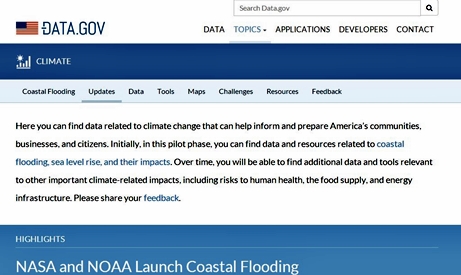Climate Data Initiative aims to prepare Americans for the worst of climate change

Saying it wants Americans to be prepared for extreme weather events sparked by climate change, the White House has launched what it calls the "Climate Data Initiative."
The initiative will make available on the websites data.gov/climate, maps and data sets on the country's infrastructure and geographical features like bridges, roads, tunnels and canals. The information comes from NASA, NOAA, the Department of Defense, the US Geological Survey and other federal agencies.
Obama administration adviser John Podesta and White House science adviser John Holdren are leading the initiative. They called on tech innovators to use the data sets to help build interactive maps and data-driven simulations that could help people plan for natural disasters.
Extreme weather events caused more than $110 billion in damages in the US and killed more than 300 people in 2012.
"While no single weather event can be attributed to climate change, we know that our changing climate is making many kinds of extreme events more frequent and more severe," they wrote in a White House blog post. "Rising seas threaten our coastlines. Dry regions are at higher risk of destructive wildfires. Heat waves impact health and agriculture. Heavier downpours can lead to damaging floods."
Several companies have already joined the initiative. Google said it would donate one petabyte of cloud storage for the data sets, along with 50 million hours of high-performance computing with its Google Earth Engine platform.
Microsoft will donate 800 terabytes, or around one petabyte, of cloud storage to 40 climate change research ventures. It will also customize its "Fetch Climate" tool, which works by accessing satellite and other data to show how a specific location has altered over time.
Mapping software company Esri said it will partner with 12 US cities to create free and open "maps and apps" that will help local governments plan for natural disasters.
Intel said it will host three climate-change "hackathons" this year in Chesapeake Bay, New Orleans and San Jose. The events will challenge computer science and engineering students in each location to make useful new apps and tools by using current federal data.